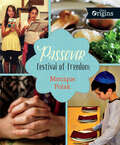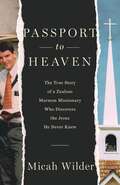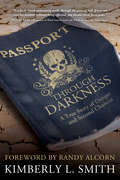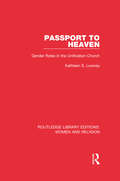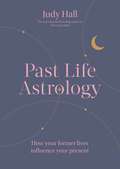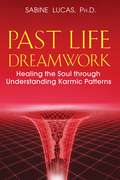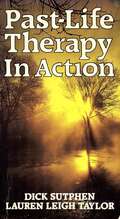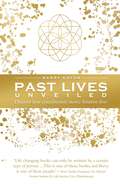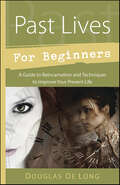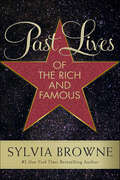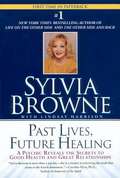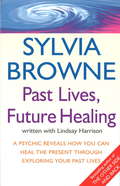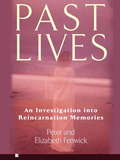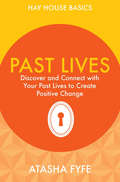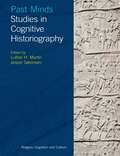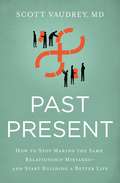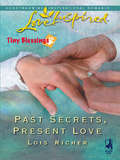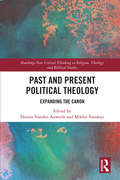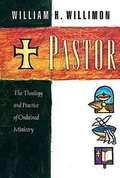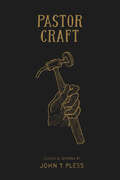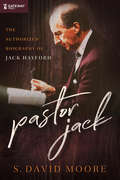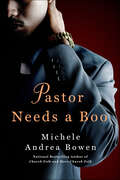- Table View
- List View
Passover: Festival of Freedom (Orca Origins #1)
by Monique PolakDuring Passover, Jews are reminded of how, more than three thousand years ago, their ancestors emerged from slavery to become free men and women. Bestselling author Monique Polak explores her own Jewish roots as she tells the Passover story, which reminds us that the freedom to be who we are and practice our religion, whatever it may be, is a great gift. It also teaches us that if we summon our courage and look out for each other, we can endure and overcome the most challenging circumstances. Enlivened by personal stories, Passover reminds us that we can all endure and overcome the most challenging circumstances. Passover is the first in a series of books called Orca Origins that will examine ancient traditions kept alive in the modern world. Other books in the series will cover Ramadan, Chinese New Year and Diwali.
Passport To Heaven: The True Story Of A Zealous Mormon Missionary Who Discovers The Jesus He Never Knew
by Micah WilderWhen missionary Micah Wilder set his sights on bringing a Baptist congregation into the Church of Jesus Christ of Latter-day Saints, he had no idea that he was the one about to be changed. Yet when he finally came to know the God of the Bible, Micah had no choice but to surrender himself—no matter the consequences. For a passionate young Mormon who had grown up in the Church, finding authentic faith meant giving up all he knew: his community, his ambitions, and his place in the world. Yet as Micah struggled to reconcile the teachings of his Church with the truths revealed in the Bible, he awakened to his need for God’s grace. This led him to be summoned to the door of the mission president, terrified but confident in the testimony he knew could cost him everything. Passport to Heaven is a gripping account of Micah’s surprising journey from living as a devoted member of a religion based on human works to embracing the divine mercy and freedom that can only be found in Jesus Christ.
Passport through Darkness
by Kimberly L. SmithAs she shares her extraordinary stories of fighting human trafficking as an ordinary mom, Kimberly Smith offers hope for readers who wonder if God is calling them to greater things. Passport Through Darkness takes readers on Smith's journey from normal family life and business, to Europe, to the deserts of Africa and ultimately, to the deserts of her own soul as she tries to live well as an imperfect American mom, crusade for justice for orphans around the world, and embrace God's extraordinary dreams for her. When Kimberly and her husband risk everything to answer God's call, they see God change and restore them--even amid exhaustion, marital struggles, and physical limitations. This heartbreaking, heartlifting book is for anyone who longs to see God move their life from normal to one that matters. It is a call to readers to take one more step on their journey to know God's heart.
Passport to Heaven: Gender Roles in the Unification Church (Routledge Library Editions: Women and Religion)
by Kathleen S. LowneyThis book focuses on the gender roles within the Unification Church, and on particularly the gender roles as expressed through the vows of marriage. It examines the more widely shared patriarchal assumptions about women in a circumscribed socio-religious environment, with the Church’s gender role system being investigated largely on the level of its theological explanations for gender roles. The Church’s ethos, its lived reality, is also examined, and for this many interviews have been conducted with the ‘blessed’, the married couples. First published in 1992.
Past Life Astrology: How your former lives influence your present
by Judy HallUsing the ancient Indian form of karmic astrology, we can discover the effect of our past lives on the present.This guide aims to impart the practical skills needed to see your own present-day path according to the teachings of karma and reincarnation. By calculating and understanding how to read your birth chart you can understand patterns that have built up over many lifetimes. Judy Hall offers detailed explanations on types of karma, how souls reincarnate and how patterns are carried forward. Past Life Astrology examines karmic themes within each sun-sign and then goes on to show how these themes are played out throughout life, meaning you can start to apply the information in a practical way to your own soul journey, wherever you are in this lifetime.
Past Life Astrology: How your former lives influence your present
by Judy HallUsing the ancient Indian form of karmic astrology, we can discover the effect of our past lives on the present.This guide aims to impart the practical skills needed to see your own present-day path according to the teachings of karma and reincarnation. By calculating and understanding how to read your birth chart you can understand patterns that have built up over many lifetimes. Judy Hall offers detailed explanations on types of karma, how souls reincarnate and how patterns are carried forward. Past Life Astrology examines karmic themes within each sun-sign and then goes on to show how these themes are played out throughout life, meaning you can start to apply the information in a practical way to your own soul journey, wherever you are in this lifetime.
Past Life Dreamwork: Healing the Soul through Understanding Karmic Patterns
by Sabine LucasThe first book to approach reincarnation from the perspective of dreams • Identifies soul bloodlines, the key to past life therapies • Combines the author’s own experiences with case studies and dreamwork with empirical research • Reveals how the analyst and client are often karmically linked In Past Life Dreamwork, Sabine Lucas examines “soul bloodlines”--character traits, talents, and life issues that are the common elements and circumstances of successive past lives. Found threaded through our dreams, these bloodlines reveal the forces manifesting in this life, and, taken together, they shape individuality as well as destiny within the reincarnation cycle. Though a wealth of past life related material regularly surfaces in dreams, until now dreamwork has been largely ignored as a therapy for successfully integrating past life experiences. Using the results of 27 years of personal and professional work, Lucas explains that past life memories help us work out karma on the macro level and trauma on a micro level. She distinguishes three types of past life dreams--classic, informatory, and hybrid--and demonstrates how to distinguish these from other dreams. Her dramatic case studies illustrate the effectiveness of dream therapy in recognizing and integrating the resonant and recurrent circumstances and ethical dilemmas that are played out in the subconscious mind. These psychologically revealing stories bear witness to how individuals are made whole through the integration of common strands of forgotten or repressed past lives. Lucas shows that the integration of past lives enriches the conscious self and also promotes universal tolerance through an understanding of the patterns of our psychic soul inheritance.
Past Life Therapy in Action
by Dick Sutphen Lauren L. TaylorPast Life Therapy in Action Revised Edition by Dick Sutphen.
Past Lives Unveiled: Discover how consciousness moves between lives
by Barry EatonStruggling to stay alive with a gaping wound across my back, I desperately wondered how I got to this point. My knife-wielding opponent was not the attacker... He'd been defending himself against an ego-driven, menacing thug who was intent on hurting him. That thug was me. In a hole of anxiety and depression, Luke Kennedy resorted to drugs, alcohol, graffiti and fighting in a desperate bid to silence his frantic mind. Soon he was leading a street-fighting and graffiti crew, and constantly coming close to killing others or being killed. Tortured by the voices in his head, Luke began looking for an out. Eventually he found it - and lost 47 kilos in the process. Redemption Road is the gripping and powerful story of Luke's journey from ego-driven, obese thug to fit, sober and successful business owner whose focus is on helping others turn their lives around.
Past Lives for Beginners: A Guide to Reincarnation & Techniques to Improve Your Present Life
by Douglas De LongLearn simple ways to uncover your past lives and create a better presentExplore your previous lifetimes, embrace your wondrous history, and recognize that you, as a human soul, are eternal. Once you discover your past lives, you can change the present in positive ways and ultimately create a better future.Past Lives for Beginners is a detailed and approachable introduction to understanding reincarnation and how it impacts your present life. Using fascinating case studies, author Douglas De Long describes different types of past-life recall experiences and shares his favored techniques to gain access to those memories, including meditations and visualizations. This guide provides a wealth of exercises and resources for understanding past lives, allowing you to explore spiritual growth and your own immortality.Connect with spirit guides and religious figuresLearn to forgive past-life transgressionsDiscover future lives and how to work toward smooth life transitionsEnhance your psychic and spiritual gifts with hands-on techniques
Past Lives of the Rich and Famous
by Sylvia BrowneIn Past Lives of the Rich and Famous, Sylvia Browne, the renowned New York Times bestselling author and reigning queen of psychics provides a rare and riveting look at the (often very surprising) lives some of our most beloved celebrities experienced in the past—before our own time.Unlike any other book she has written, Past Lives of the Rich and Famous explains what happens before birth. With assistance from her spirit guide, Francine, she offers a unique new look at more than fifty beloved celebrities, including Steve Jobs, Amy Winehouse, Elizabeth Taylor, Michael Jackson, Whitney Houston, and Martin Luther King Jr. Browne does not just reveal what celebrities were doing in their past lives, but also makes a spiritual connection between what they did then and what they did now. She also tells us whether this is a celebrity’s final life, or whether he or she will continue the journey into future lives.
Past Lives, Future Healing
by Sylvia BrowneThe Other Side and BackandLife on the Other Sidewere phenomenal #1New York Timesbestsellers. Now world-renowned psychic Sylvia Browne returns with a book that takes her millions of devoted readers on an extraordinary journey of past lives. From two-time #1 bestselling author Sylvia Browne comes a remarkable book that shows how our past lives affect everything from our relationships to our health and well-being. With millions of copies of her book in print, Sylvia Browne has proven herself the reigning expert on psychic phenomena. In her newest book, theNew York Timesbestselling author takes us into the mysteries of our own bodies in a comprehensive guide that explores the far-reaching influence the afterlife can have on our health and happiness in this life. With the unique understanding, sensitivity, and profound insight that distinguished her previous books, Browne gives us an unprecedented look at the way so many of our health and relationship problems have their roots in our unresolved past lives: from unexplained illnesses to bizarre phobias, from irrational anxieties and fears to the partners and loves we choose. Even birthmarks and recurring dreams can be traced directly back to these past existences. In the friendly, no-nonsense style that her fans adore, Browne shares amazing and inspiring real-life stories of people who have transformed their lives through understanding their previous existences. PAST LIVES, FUTURE HEALING takes readers on another fascinating odyssey into the other side. And like her earlier books, this will not only help people lead more satisfying and fulfilling lives, but will illuminate a hitherto unknown path to overcoming many of the most frustrating and devastating physical and emotional problems that can occur in life.
Past Lives, Future Healing: A psychic reveals how you can heal the present through exploring your past lives
by Sylvia Browne Lindsay HarrisonSylvia Browne is a world-renowned psychic and best-selling author. In this book she shows how many of the health and relationship problems we are experiencing in our present lives could be the result of unresolved issues in our past lives. Bizarre phobias, unexplained illnesses, irrational anxieties and the partners we choose can all have their roots in our past lives, and even birthmarks and recurring dreams can be traced back to an earlier existence. Includes powerful stories of people who have positively changed their lives through their understanding of previous lives
Past Lives, Future Lives
by Bruce GoldbergDr. Goldberg writes of his findings regarding reincarnation and karma. Not only does he do past life regressions, but he finds that he can do future life progressions as well.
Past Lives: An Investigation into Reincarnation Memories
by Elizabeth Fenwick Peter FenwickWho were you? Containing over a hundred first-hand accounts, Past Lives is an insightful exploration of reincarnation that questions the very framework of Western science.
Past Lives: Discover and Connect With Your Past Lives to Create Positive Change
by Atasha FyfeThis book introduces the idea that we have multiple lifetimes, and explores how past life awareness can lead to a happier, more meaningful and more fulfilled experience of life in the present. You’ll learn about: •how regression works •the secret clues to your past lives that show up in this life •the astonishing cases of children's past life memories •how to find out more about your own past lives •the benefits of past life awareness for improved health, abundance and relationships Hay House Basics is a new series that features world-class experts sharing their knowledge on the topics that matter most for improving your life. If you want to learn a new skill that will enhance your wellbeing, Hay House Basics guarantees practical, targeted wisdom that will give you results!
Past Minds: Studies in Cognitive Historiography (Religion, Cognition and Culture)
by Luther H. Martin Jesper SørensenHow do historians understand the minds, motivations, intentions of historical agents? What might evolutionary and cognitive theorizing contribute to this work? What is the relation between natural and cultural history? Historians have been intrigued by such questions ever since publication in 1859 of Darwin's The Origin of Species, itself the historicization of biology. This interest reemerged in the latter part of the twentieth century among a number of biologists, philosophers and historians, reinforced by the new interdisciplinary finding of cognitive scientists about the universal capacities of and constraints upon human minds. The studies in this volume, primarily by historians of religion, continue this discussion by focusing on historical examples of ancient religions as well as on the theoretical promises and problems relevant to that study.
Past Present: How to Stop Making the Same Relationship Mistakes---and Start Building a Better Life
by Scott Vaudrey, MDPast Present shows readers how to change destructive relationship patterns by identifying the root issues from their pasts and finding the source of healing for their unique stories.No matter where we are in life, both our greatest joys and our deepest heartaches are linked to the people in our lives--family, friends, or coworkers. And each of us brings both beauty and brokenness into relationships. The origins of our beauty and our brokenness often can be traced to the patterns of relating we learned when we were young. We relate to others in ways that reflect the distorted messages we heard and internalized earlier in life. The good news is this: we don't have to remain stuck in these patterns. In Past Present, Scott Vaudrey equips us with tools and a strategy toidentify the messages we've internalized--both as children and as adults--from the influential people in our lives;refute and repair the distorted messages that led to unhelpful patterns now holding us back; andrecognize the productive messages we've internalized and maximize the strengths they built into us along the way.We can't undo yesterday. But we can do the rest of our lives better.
Past Secrets, Present Love
by Lois RicherTo: Jared From: Kelly Re: More shocking news As director of Tiny Blessings adoption agency, I appreciate the unbiased way you've reported all the scandalous information that has come out recently. Well, I have another exclusive for you: investigator Ross Van Zandt broke the news to me last night - I am the missing baby, the child taken from her mother at birth. It was quite a shock, but with God's help, I can come to terms with this. I'm hoping Ross will help me uncover my biological father's identity, but he seems hesitant. . . . And off the record - the handsome PI has caught more than my professional interest!
Past and Present Political Theology: Expanding the Canon (Routledge New Critical Thinking in Religion, Theology and Biblical Studies)
by Dennis Vanden Auweele Miklos VassányiThis book demonstrates how discussions of Political Theology have been a constant feature throughout philosophical modernity and that they continue to impact contemporary political debates. By tracing the historical roots and detailing the contemporary outworking of Political Theology in Europe, it contends that this growing field requires a broader "canon" in order for it to mature. Political Theology is shown here to be about the diversity of relationships between religious beliefs and political orientations. First engaging with historical debates, chapters re-examine the relationship between personal conviction and societal orientation on such topics as the will to believe, evil, individualism, the relationship between church and state, and the relationship between belief and natural science. The volume then establishes the relevance of these debates for the present day. As such, it invites engagement on the back and forth between religion and politics in a liberal democracy and a communist state, on how communitarianism relates to religious language, on the diversity of Christian and Jewish political theology, and the politics of toleration. By broadening out the field of Political Theology this book offers the reader a more nuanced understanding of its sustained influence on public life. As such it will be of interest to academics working in Political Theology, but also Theology, Philosophy and Political Science more generally.
Pastor
by William H. WillimonOrdained ministry, says Willimon, is a gift of God to the church--but that doesn't mean that it is easy. Always a difficult vocation, changes in society and the church in recent years have made the ordained life all the more complex and challenging. Is the pastor primarily a preacher, a professional caregiver, an administrator? Given the call of all Christians to be ministers to the world, what is the distinctive ministry of the ordained? When does one's ministry take on the character of prophet, and when does it become that of priest? What are the special ethical obligations and disciplines of the ordained? In this book, Willimon explores these and other central questions about the vocation of ordained ministry. He begins with a discussion of who pastors are, asking about the theological underpinnings of ordained ministry, and then moves on to what pastors do, looking at the distinctive roles the pastor must fulfill. The book also draws on great teachers of the Christian tradition to demonstrate that, while much about Christian ministry has changed, its core concerns--preaching the word, the care of souls, the sacramental life of congregations--remains the same. Ordained ministry is a vocation to which we are called, not a profession that we choose. To answer that call is to open oneself to heartache and sometimes hardship; yet, given the one who calls, it is to make oneself available to deep and profound joy as well.
Pastor Craft: Essays & Sermons
by John T PlessThis book has grown out of a ministry that has spanned nearly four decades. It is built around the conviction that theology does matter for theology has to do with words from God, words spoken back to God and words spoken to the world. Luther once remarked something to the effect that the cross alone is our theology. Before Luther there was the Apostle Paul who came to the Corinthians with "the word of the cross" (1 Cor. 1:18) determined to know nothing among them but Jesus Christ and Him crucified (see 1 Cor. 2:2). In essays, sermons, and homiletical studies this volume seeks to continue that apostolic aim. A significant portion of this book is devoted to sermons. Sermons, of course, are written to be preached rather than published. None the less, there is value in reading sermons. Such reading is a way of meditating on God's Word. This reading might also prompt other preachers to explore an overlooked dimension of a text for their proclamation. Sermons are never generic; they always have a context. Many of these sermons were preached in Kramer Chapel on the campus of Concordia Theological Seminary in Fort Wayne where the author has served as a professor since 2000. These sermons are preaching for future preachers, equipping them in the way of Luther's oratio, meditatio, and tentatio for the burdens and joys of the pastoral office. There are occasional sermons from conferences, funerals, and ordinary congregations. Over the years, Prof. Pless has preached at over thirty ordinations or installations of pastors. A sampling of these sermons are included. They bear the imprint of the bond that exist between professor and student. More importantly they promote Jesus Christ as the Lord who calls men into the ministry and enlivens and sustains them there with His Gospel for the good of His flock. The remainder of the book is devoted to essays in pastoral theology covering the range of the author's interest from Hermann Sasse to vocation, liturgical practice to the Small Catechism, challenges to confessional Lutheranism in North America to the office of the ministry. Many of these essays originated at conferences both in the USA and abroad. The contents of this volume flow from the pulpit, desk, and podium of a man who seeks not novelty or creativity but faithfulness to the word of the cross.
Pastor Jack: The Authorized Biography of Jack Hayford
by S. David MooreJack Hayford is rightly known as a &“pastor of pastors.&” The facts bear this out: he is the author of over 50 books, the writer of 600 hymns and choruses (including the internationally popular &“Majesty&”), and a pentecostal leader committed to building bridges while maintaining the integrity of the gospel. For Pastor Jack, David Moore was granted unrestricted access to Hayford&’s journals and personal correspondence and completed over 60 hours of personal interviews to offer the first authorized biography of this extraordinary man. From the miraculous healings he experienced as a child to the moment he sensed God calling him to the pastorate for more than 60 years of fruitful ministry, Hayford has witnessed and proclaimed God&’s mighty works with boldness and grace. This exploration of his life and legacy will inspire Hayford&’s lifelong followers as well as those new to his words and faith.
Pastor Needs a Boo (Pastor's Aid Club)
by Michele Andrea BowenMichele Andrea Bowen made a name for herself years ago during the African-American inspirational fiction craze. Now, in Pastor Needs a Boo, she's back with an amazing journey of faith, drama, and love.It was a regular New Jerusalem Gospel United Church work day for Reverend Denzelle Flowers when Veronica Washington, Keisha Jackson, and Marsha Metcalf showed up after losing their jobs on the same day, same morning, and almost at the same time. Denzelle struggled to solve that first problem. The other problem—the lovely Marsha—would be much harder to solve. Denzelle didn't even know how to fight wanting to turn in the playah's card and getting "booed" up with the poster girl for "church girls." Marsha Metcalf and her fellow unemployed church members aren't Denzelle's biggest problem, though. He is running for bishop, and his enemies—a more ruthless consortium of corrupted clergy—want power badly enough to go to rather extreme lengths for it because the stakes are just that high. Now, his ex-wife was back and sleeping with the enemy, digging for dirt. Reverend Denzelle can't fight this battle alone. This pastor needs a ‘boo' who will stand by his side. Before the dust settles, both Marsha and Denzelle's faith and love will be put to the ultimate test.
